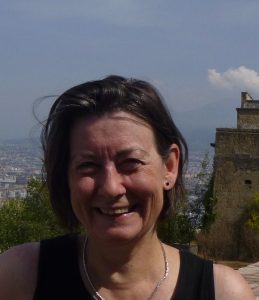My starting point was historic landscapes and buildings, and textile history. After first graduating, I was documentary researcher on the Yorkshire Textile Mills survey (Royal Commission on Historical Monuments). It was a great job, a wonderful training in historical research.
It was then that I found there was no solid account of textile machine-making in its earliest phases – that very interesting time centred in the late-eighteenth century, just as it was becoming the decisive trade of British industrialisation. Historians saw it as a “submerged sector”, because so few business records had survived from small engineering workshops.
Of course this was true, and it was also something of an excuse for not venturing into new grassroots activities, however important those might be. To me it was a challenge. The RCHM research experience had shown me that there are other ways of doing things, and always more sources to be found – and that’s even more true now, with today’s electronic resources.
My doctoral thesis (University of York, 1994) about textile engineering’s origins in Yorkshire was a significant first step. Ever since, I’ve taken great satisfaction in re-creating historical contexts from fragmentary sources. It’s a question of putting people and communities back into the picture.
The years from 1995 were spent on research projects: first on mid-nineteenth century submarine telegraphy, which was essentially the early history of electrical engineering, just as textile machinery had been fundamental to mechanical engineering.
Specializing in industrial history was a great help in to me as county editor for the newly launched Victoria County History of Durham, from 1999. Unusually for the VCH, which has tended to focus on rural parishes, two great industrial centres were subjects of their Durham ‘big red books’ – Darlington, and then Sunderland. We also produced the VCH’s first ever paperback, on the townscape of Darlington, and later two others were published alongside Sunderland’s volume in the county series.
Now I’m in charge of my own research agenda – and back to the thrill of the chase. I’d never had time to rework the thesis and make a book of it. It still seemed a topic that historians shied away from, and luckily no one had pre-empted me during those decades doing other things. I’d continued to collect material when stumbling across it in other research. Dusting off my old work, though, I realised that the DPhil needed more than a bit of a rewrite.
In fact it took longer than the original research had done. The possibilities that the internet has opened up are such a gift to historians like me, who work with bits and pieces and try to make connections at workshop level, which is where many really significant innovations took place. After five years, The Age of Machinery: Engineering the Industrial Revolution 1770-1850, about early machine-making in northern England, was published by Boydell in 2018.
And there’s more. Making an Industrial Revolution has a wider perspective, of British regions in the long (very long) eighteenth century. It has a lot to say about the iron trade, about how science related to industrial innovation, and develops themes of community by proving exceptional linkages between players great and small. Publication (by Boydell again) is due in late 2024.
None of my research on these two volumes could have happened without the re-kindled connection to the University of Leeds School of History, where I am a Visiting Research Fellow. This enabled me to continue research from home through the pandemic years, and I’ll be forever grateful for that.
As always, I have other irons in the fire. I appeared on David Olusoga’s ‘A House Through Time’, when it visited Leeds in 2021. I was an advisor to Royal Mail on its ‘Industrial Revolutions’ stamps and accompanying material, also in 2021. During lockdown, I did talks on local industrial history, for Leeds Libraries via Zoom, and on East Leeds FM community radio. Previously I’ve been president of the Yorkshire Archaeological and Historical Society, 2015-19, and History Editor of the society’s Yorkshire Archaeological Journal, 2011-15, and now again from 2020.
I’ve been playing around with an idea which has at its centre childhood poverty in Spen Valley a century or more ago, and have already done a lot of work on it. At last I have a plan which works, and I’m on it. That’s good because the topic has certainly found its time. The old saw – that if we neglect the reality of history, we’re in danger of repeating it – proves itself every time we switch on the news. The restricted lives and opportunities of the Edwardian poor, our recent forebears, are too close for comfort. Telling the story of Strawberry Bank feels important.
Next after that: a book on early industrialization in Leeds – written for a non-academic readership.
Gill Cookson
updated April 2024
© 2024
